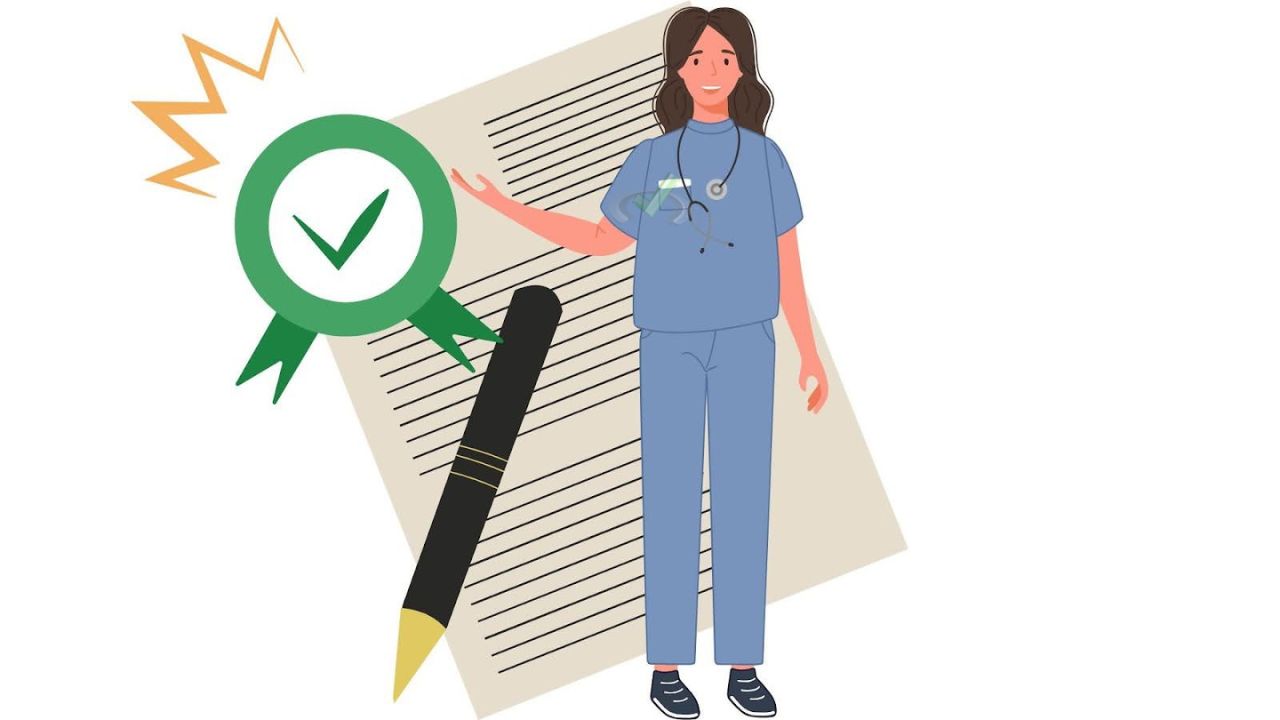
The NCLEX passing score doesn’t work like a traditional test. No one gets a set number of questions, and no one needs to score a specific percentage. Instead, the exam measures whether you have what it takes to handle real-life nursing decisions.
The NCLEX doesn’t care how many easy questions you answer correctly. It wants to know if you can think like a nurse when it matters most. That’s why two people can take the exam, answer a completely different number of questions, and still pass.
So, what exactly is the NCLEX passing score? The NCLEX-RN passing standard is -0.18 logits, and the NCLEX-PN passing standard is -0.26 logits (NCSBN, 2023). That number isn’t a percentage—it’s a measurement of your ability compared to the difficulty of questions you answer correctly.
Let’s break this down into simple, practical terms so you know exactly how the NCLEX determines whether you pass or fail.
How Does the NCLEX Determine Your Passing Score?
Forget about needing a 75% or 80%. The NCLEX-RN or NCLEX-PN doesn’t work like that. Instead, it tracks your performance using Computer Adaptive Testing (CAT) and adjusts the difficulty of your questions in real time.
How the NCLEX Pass-Fail System Works:
This is why some people pass in 85 questions, while others answer all 150. The number of correct answers doesn’t matter—it’s how well you handle difficult questions that determines if you pass.
Understanding Logits: What Do They Mean?
A logit is a unit of measurement that compares your ability level to the difficulty level of NCLEX questions. Instead of a percentage, your performance is measured on a logit scale.
In simpler terms: If you consistently answer higher-difficulty questions correctly, you pass. If you struggle with questions near the passing level, the system will keep testing you to determine where you stand.

Breaking Down the NCLEX Question Levels
The NCLEX doesn’t test simple memorization. It measures critical thinking, judgment, and prioritization—all skills you’ll need as a working nurse.
1. Below Passing-Level Questions
These questions test basic recall. They involve definitions, normal lab values, and textbook knowledge.
Examples:
Answering these correctly does not mean you will pass. These questions are too basic to prove competency.
2. At Passing-Level Questions
These questions require critical thinking. They assess whether you can make nursing decisions based on patient conditions.
Examples:
Getting these right pushes you toward passing. These questions show that you understand how to apply nursing knowledge.
3. Above Passing-Level Questions
These are the toughest NCLEX-RN or NCLEX-PN questions. They require analysis, prioritization, and decision-making.
Examples:
If you are getting these types of questions, you’re doing well. The test is challenging you because it recognizes you as a competent test-taker.
How Many Questions Do You Need to Answer to Pass?
The number of questions on the NCLEX varies from person to person.
1. Passing Early (85-100 Questions)
2. Continuing to the Maximum (150 Questions)
3. Failing Early
What Happens If You Run Out of Time?
If you run out of time before answering 85 questions, you fail.
If you have answered at least 85 questions, the system evaluates your last 60 answers:
Time matters. Don’t overanalyze early questions—you need to reach at least 85 questions before time runs out.

NCLEX Pass Rates: How Many People Pass on Their First Attempt?
Passing the NCLEX on the first try gives you the best chance of success. Here are the latest pass rates:
(Source: NCSBN, 2023)
If you fail, you must wait 45 days before retaking the test. Pass rates drop for repeat test-takers, so preparing well before your first attempt is important.
Passing the NCLEX on your first try is the goal—but it takes the right strategy. Get expert guidance, a daily NCLEX-style question, and insider tips delivered straight to your inbox with our NCLEX Daily Dose Emails. Stay on track and give yourself the best shot at passing. Subscribe now and start preparing smarter.
Best Strategies to Meet the NCLEX Passing Score
The NCLEX passing score isn’t about answering the most questions correctly—it’s about showing the ability to think critically. This means studying smarter, not harder. Preparing the right way can make all the difference, and using strategic methods can push your performance above the passing standard.
Let’s go over some of the best techniques to boost your NCLEX score and pass on the first attempt.
1. Study Based on NCLEX Categories, Not Just Random Topics
The NCLEX is structured around Client Needs Categories rather than individual subjects like anatomy or pharmacology. That means you need to focus on how questions are asked within these major categories:
Understanding these categories helps you study with intention instead of cramming broad topics that may not be relevant. The test isn’t about memorization—it’s about applying nursing principles within patient scenarios.
Want a fast and effective way to study? Grab our NCLEX Cheatsheets—your go-to guide for understanding question types, prioritization strategies, and must-know nursing concepts. Whether you're prepping for test day or reviewing tough topics, these cheatsheets keep you focused on what matters.
2. Simulate the NCLEX Testing Experience
The NCLEX is long. Sitting for up to five hours answering adaptive questions takes mental stamina. If you only study in short bursts, NCLEX test day will feel overwhelming.
To prevent this, take full-length practice tests under conditions similar to the real exam:
The more you train your brain to handle long periods of focus, the easier the actual NCLEX will feel.
Common Mistakes That Lower Your NCLEX Passing Score
Many test-takers fail not because they don’t know the content, but because they fall into common traps. These mistakes can pull your score down, even if you study well.
Here are some things to avoid if you want to pass the NCLEX without stress.1. Over-Relying on Memorization
The NCLEX is not a recall-based test. While it’s important to know lab values, medications, and procedures, simply memorizing facts won’t help much. The exam evaluates how well you apply knowledge to patient scenarios.
Example mistake:
A student memorizes that digoxin treats heart failure but doesn’t understand why monitoring potassium levels is essential when giving it. This could lead to missing a priority question on digoxin toxicity.
What to do instead:
2. Not Practicing Enough NCLEX-Style Questions
Some students read textbooks for weeks but barely practice NCLEX-style questions. This is a big mistake. The way NCLEX questions are worded is different from classroom exams, and you need to get used to them.
The NCLEX is full of:
What to do instead:
3. Second-Guessing Answers Too Much
A common issue among test-takers is changing correct answers to incorrect ones because they second-guess themselves.
Example mistake:
A student picks the right answer but then doubts their reasoning, overanalyzes, and changes it to the wrong one. This leads to unnecessary mistakes.
What to do instead:

Final Thoughts on What You Need to Know About the NCLEX Passing Score
The NCLEX passing score doesn’t rely on a percentage—it depends on how well you answer higher-level questions.
The best way to prepare for your exam? Practice real NCLEX-style questions, focus on critical thinking, and train with full-length exams. This test isn’t just checking knowledge—it’s checking whether you’re ready to think like a nurse.
